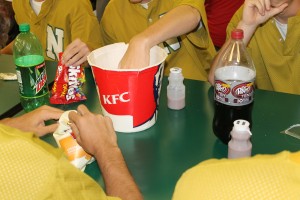 On any average day, the bell will ring at three and students will fill the halls anxious to get home, or to their next after school activity. Many athletes, however, will most likely hop in their cars and take the short drive to McDonald’s. Here they will order the greasy delights of their choice, enjoy it with friends and return to Northwood for their game.
On any average day, the bell will ring at three and students will fill the halls anxious to get home, or to their next after school activity. Many athletes, however, will most likely hop in their cars and take the short drive to McDonald’s. Here they will order the greasy delights of their choice, enjoy it with friends and return to Northwood for their game.
Many athletes eat out before games at the nearest restaurants, which include Subway, McDonald’s and Elizabeth’s Pizza, and after games they eat out again. Many feel that they should be able to eat whatever they please before a game.
“[I] usually eat anything before basketball, like a Philly cheese steak, and right before the game I’d eat a Snickers and a Mountain Dew,” said senior basketball/baseball player John Wieland.
Some students do occasionally make a conscious effort to improve their diets, while some believe that unhealthy food is acceptable because they are exercising so much. Others believe an improvement to diet would result in an improved performance.
“I definitely don’t eat fast food before a game because I would feel bad,” said senior soccer/volleyball player Hannah Lawrence.
Senior soccer player Rafael Orellana thinks his diet and exercise balance out.
“I really don’t eat healthy, but I run it off during soccer so I would say it balances out,” said Orellana.
Senior lacrosse player Anthony Harr does occasionally try to improve his diet by including salads and removing the dressing, but agrees that it’s okay to eat unhealthily if one is going to work it off. However, he also agrees that making changes could improve his performance.
“If I made a really big change to [my diet], I think [my performance] would improve. I would play better and have more energy,” said Harr.
He does not stand alone with this opinion.
“It would give me more endurance and I wouldn’t get tired as fast as I do now,” said sophomore basketball player Tyeshia Baldwin.
While most sports do not require a strict diet, some athletes, such as wrestlers, have to pay attention to what they eat and how much they eat.
“It’s difficult when you’re used to eating candy [in the off season], and then you can’t eat anything [because] you have to cut weight. I dropped 20 pounds over wrestling season and it was tough,” said senior wrestler Gino LaManna.
Though LaManna claims to have a healthy diet, eating only peanut butter and jelly with Gatorade before matches and games, the question that rises is: Is it really safe to have a fluctuating weight throughout the year?
Studies show that this form of dieting is hard on the body and puts athletes at risk for heart problems. Though shedding a few pounds for wrestling is not going to cause heart disease, the habit of rapid weight loss could create problems in the future.
Though the view of unhealthy diet and active lifestyle seem okay to some students, others feel that both are key in living well.
“There are a lot of other factors; you may be skinny, but you can still be unhealthy,” said Lawrence.
The majority of athletes agree that their eating habits are poor and that they could improve, but a handful feel like they have their diets under control.
“[Before games] I try to eat a banana so I don’t get cramps,” said sophomore soccer/tennis/basketball player Hannah Holloway.
Holloway had previously had the experience of eating poorly and playing immediately after.
“If I have eaten a lot of cookies or something, I feel like I’m slower,” said Holloway.
Junior basketball player Alexis Brower agrees with Holloway and has experienced the effects of an unhealthy meal.
“I have eaten Bojangles’ before a game and I felt heavier,” said Brower.
While poor diet may affect some players, LaManna feels that diet does not relate to the performance of athletes.
“I see kids next to me eating candy bars and they still play well,” said LaManna.
— By Sterling Logan
